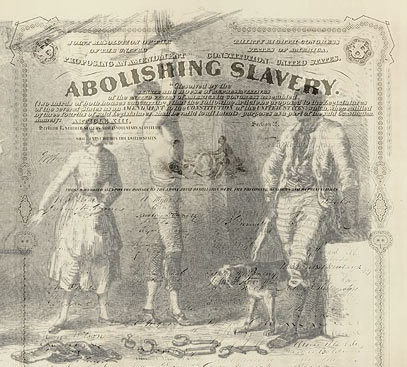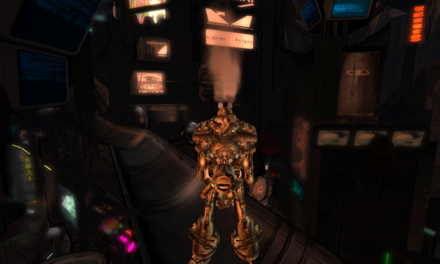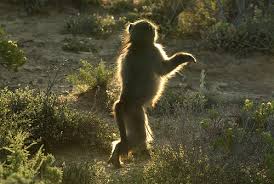 FITZHUGH VS. FITZHUGH,
FITZHUGH VS. FITZHUGH,
OR THE THIRTEENTH AMENDMENT
by Douglas Kolacki
Sometime in 1857
The meeting house stood on a hillside. George Fitzhugh, getting no younger, had to exert himself to run up the grass. He puffed for breath. Yellow light glowed from the bottom tier of windows, and the closer he got to the door, the more the clock tower steeple seemed to rise into the night sky. A slight drizzle was falling, and he welcomed the cool drops on his face.
Fitzhugh took hold of the front door handles and threw the doors wide. The doors banged against the wall. Seven hundred people looked over their shoulders at him.
He stabbed a finger at the speaker up front. “You, sir, are a fraud.” His voice rang in the silence.
“Ah. You are here.” George Fitzhugh, tall behind the pulpit, gazed across the crowd at the intruder. He beckoned with a thin arm. “Please, come up—”
Fitzhugh was already striding up the aisle. Heads turned as he passed them. He sized up the impostor as he went. The man did bear an uncanny resemblance, save the tanned and weather-beaten face and the white hair cut short, whereas the intruder’s hair spilled out in left and right waves. George Fitzhugh of Washington, DC was not a man given to outbursts, but what was one to do when this impostor appeared out of nowhere, speaking in Boston, New York and now here in Providence, Rhode Island, contradicting his every claim and argument? Until—on this very night, in the year of our Lord 1857—Congress counted votes on a Thirteenth Amendment to the Constitution.
And if it passes, slavery is finished. Millions of childlike negroes turned out to fend for temselves, to compete for work…
And that drunkard of a president, Buchanan, just ignoring the whole business!
The intruder reached the front, climbed the steps to the pulpit, and confronted this…man…with fists clenched.
The second Fitzhugh backed up a step. He gawked at his counterpart, mouth open, eyes wide and searching as if in continual attempt to grasp this sight, but never quite succeeding. He put out an arm and steadied himself against the wall. “Good Lord,” he breathed.
The intruder shook a finger. “I ought to challenge you to a duel for this. I demand to know, first, your true identity, and second, the meaning of this hoax. Mr. Garrison and Mr. Smith have no need for such gimmicks!”
A hint of color returned to abolitionist Fitzhugh’s face. He dropped his arm and straightened himself up. He matched his double’s height exactly, as did his eye color, build and jut of his jaw.
“You’re thinking,” he said, “how remarkable the resemblance really is.”
The Fitzhugh who had written Sociology of the South and Cannibals All!, who had nearly sprained his arms shoving open those heavy doors, hawked back as if to spit, but refrained from doing so. “I give you credit for cleverness, sir. It appears you have taken great care to weather your face, like a field hand’s. And so your appearance works a subtle influence on your—”
He stopped. His abolitionist double was mouthing along with his speech.
“—hearers,” the intruder finished. “And I am still waiting for your answers—sir!” For the lip movements continued, word for word, even to the final sir!
The impostor bowed. “My apologies. Your arrival has brought every memory to life. It surprises me, though it shouldn’t, for you made this same statement. —Not you yourself, but the me—the us of the time—”
“While you’re babbling, I’ll address this audience, whether or not it still matters at this point. Ladies and gentlemen?”
The intruder took hold of the pulpit. His high perch commanded a view of the auditorium, the rows of rich and well-to-do in their Sunday finery, and the poor, shabbier people thronging the high balconies. All wore identical gawking faces; no one made a sound. A forest of brass organ pipes towered up the rear wall.
“If you wish to know where the real George Fitzhugh stands, I’ll tell you. As I’ve traveled a considerable distance from our capital and missed several days of work, I hope you will grant me the courtesy of an open mind. I shall be brief.
“The negro slaves of the South are the happiest, and, in some sense, the freest people in the world. The children and the aged and infirm work not at all, and yet have all the comforts and necessaries of life provided for them. They enjoy liberty, because they are oppressed neither by care nor labor—”
A woman in the audience tittered. A man barked out a laugh, quickly stifled.
Fitzhugh looked at the abolitionist. “Mimicking me again?”
“Apologies, but I had to stop you before it appears.”
“Before what—?”
The auditorium flashed white. The audience cried out, and several women screamed. Fitzhugh’s eyes stung and he clapped his hands over them. A sharp crack sounded. When he looked again, eyes swimming, the flash had faded into a shimmer—was this real, or was it an afterimage, as a person gets after looking at the sun? The light began above a high window to Fitzhugh’s left, slashing down over his head to the floor, where it terminated between two columns. The entire meeting house was bright now, every cranny illuminated by the slash’s steady glare as well as the candles of the Waterford chandelier.
Fitzhugh wiped his eyes, blinked. He squinted. “What the….”
“Do you see something in it?” The abolitionist spoke as if nothing had happened. “A street? And beyond that, the masts of ships?”
“You know what it is?”
“I’ve been through this before, remember. It’s Jamestown, Virginia, but not of today. That would be miraculous enough. But believe it or not, it’s the Virginia of about two hundred and thirty years past.”
Fitzhugh turned on him. “Sir! What manner of—”
“—trickery is this? Perhaps this will help. You once wrote in a private letter to Dr. Garrison: ‘If history, human experience and statistics prove the evils of free society to be less than the evils of slave society, slavery should be abolished.'”
Fitzhugh opened his mouth, closed it again.
Then he raised his right arm. His double duplicated the motion at the exact same moment. Fitzhugh turned his head right, left, scratched his chin, jumped. His counterpart synchronized with him perfectly.
“God in heaven,” he breathed. “Could it truly be?”
The abolitionist pointed at the slash in reality. “This,” he said, “is the means by which I—you—gained the life of a slave.”
Fitzhugh knew his history. “Indentured servanthood?”
“Slavery by another name, as you will quickly find. The very word ‘slavery’ can be traced to the medieval Latin sclavus which was the name for the Slavs. White men, sir. By the time the first Africans were brought ashore at Jamestown, the entire chattel system was already in place. How do I know this?” The abolitionist pointed at the shimmering, crackling afterimage. “I stepped through that.”
Suddenly Fitzhugh was very aware of these Yankees around him and this most accursed of abolitionists beside him. He eyed the nearest door.
“No one is going to force you,” his counterpart said. “Neither I, nor anyone, will place a hand on you. You enter of your own free will.”
No one stirred. All seemed arrested in place by this miracle of light in their midst. The intruder let out a breath. “So you stepped through it. What happened afterward?”
“It will be as if you had sleepwalked hundreds of miles and awoke in a completely strange place. The sudden warmth in temperature, the humidity in the air, the cloudy daytime sky. You’ll suffer disorientation. And in that state, before I could sufficiently recover to evade him, a man found me. He turned out to be an emigrating agent.”
The abolitionist’s left hand twitched, came up and tapped on the pulpit. It tapped, drummed as he spoke. He seemed unaware of this. “He arranged passage for immigrants, then recouped his costs by auctioning them off. He saw an opportunity in me. The cost of transporting a man from England was about four pounds, and he could make a clear profit, having found me already here and unattached.
“I demonstrated my education, pointed out my age. I told him of the small plantation I acquired through marriage before taking up my position in Washington. He replied by citing the old law, that persons under sixty not practicing a craft must serve anyone who requires their labor. And he carried a pistol with which to enforce his wishes.
“He placed shackles on my wrists. That alone was a shock. I had never been like Peter in his old age, fettered and led where I did not wish to go. The bonds, the chains were heavier than they looked. Lifting my arms was an effort. But how was I to remove them? Other men decided exactly when they came on, how long they would stay on, and when they came off.
“Men examined us. I must say, sir, I will never regard cattle or pigs the same way again, for that was how they viewed me. I thought this couldn’t be real, and kept waiting to wake up. At the same time I waited for them to see their error, to apologize and release me. Instead one man after another came up and looked me over. Buyers of that time often preferred white, or ‘Christian’ servants, since they spoke English and could adjust better to the life in the colonies.”
The slash of light across the auditorium faded, brightened again with a crackle. The intruder kept glancing in its direction. Would it catch the place on fire?
“I have to hurry.” The abolitionist kept drumming his fingers. “I was sold to a tobacco planter who was glad to get me cheap, even if I was fifty-one years of age. Perhaps I could gain more favorable employment teaching his children to read and write? But he turned out to be a bachelor, and had no interest in education himself.
“He lived on the Tidewater, where the Rappahannock River runs into Chesapeake Bay. His house would have shamed my own plantation dwelling. I won’t mention where I resided, save that it was a cabin I shared with other servants. For a man of my years, it was a shock approaching that of the shackles, and I never grew accustomed to it.
“In the summer we worked the fields; Planting, re-planting, weeding, worming. I was responsible for thousands of delicate tobacco plants, each with its own hillock of earth, each requiring my constant care and attention. When it grew too dark for field work, there were other tasks. I became well acquainted with ‘beating at the mortar,’ pounding soaked corn with a pestle to make everyone’s bread, beginning with the master’s.”
And in a quiet voice that rose up and filled the auditorium, he recited:
Sometimes when that a hard day’s work we’ve done,
away into the mill we must be gone,
Till twelve or one o’clock a grinder corn,
and must be up by daylight in the morn.
“That,” he continued, louder, “was our lives for three-fourths of the year. In the winter, we were sent into the forest to hack down oaks and pines. More land always had to be cleared, for England’s demand for tobacco was considerable.
“Thus I lived for two years, seven months and nine days. Remember that, sir: Two years, seven months, nine days. Then I awoke before sunup and saw, for the second time, the light. Beyond it I could glimpse trees, a river; I had no way of knowing where it was. I scrambled through and soon learned that the river was the Potomac, and our capital only a few miles’ walk away…and that by still another miracle, I had arrived home ten months prior to my departure from Providence.
“But the worst surprise of all was still to come. Imagine arriving home to see yourself—your soft, groomed, proper self, sitting on the front porch with Mary! I received the same shock tonight when you came in, although I was expecting you.” He paused. “Did any men from around the city, ever claim you begged money from them?”
Fitzhugh thought back. “I’ve passed a few fellows who looked at me strangely. And one remarked how glad he was to see me in a better state. I thought he had taken me for someone else.”
“I journeyed around the South, my native Virginia, down through the Carolinas and Alabama. I wanted to see it anew in light of my experience. Once again I was a privileged white man. People showed me courtesy and respect, yet I was the same one who had been sold at auction.
“I made for Boston and met Mr. Garrison. Naturally he gave me all the help I needed, though I could never tell him the truth about what had happened.”
Fitzhugh kept his eyes fixed on the phenomenon. “And this is all going to happen to me?”
“Yes.”
“Well…what happens if I simply refuse?”
“We have no way of knowing. It may disrupt this whole business and cause me to disappear. Or—”
“I’ll never live your experience, never change my views, and that likely means no Thirteenth Amendment?”
“But the fact remains that once I actually lived in fetters—”
“Now see here. Of course you weren’t meant for such a life. One can scarcely hope that would turn out well.”
The abolitionist’s face hardened. “I said those same words myself. Every one.”
Did he? The intruder searched his counterpart’s face for any possible clues. Finding none, he cleared his throat.
“Very well. I believe I’ve seen enough.”
He climbed down from the pulpit and started up the aisle, away from this weird doppelganger, from the even weirder blaze of light crackling in the air.
The abolitionist’s voice soared after him. “If you leave now, then the last hope for slavery is gone.”
Fitzhugh kept going, slowed; stopped. He turned around. A lady in the pew to his left, held her infant tight as if he might try to snatch the child and sell it down the river, white or no.
“Return home,” the abolitionist continued from the pulpit, “and wait to see what transpires. Anything could happen. This could all be undone, as you say. But if the amendment remains and passes, then this country is condemned. Slaves without masters competing, starving, society dissolving into the chaos you always warned of…and it shall go down in history that George Fitzhugh, a Saint Paul or a Judas depending on who you ask, is responsible.”
Well, perhaps he was exaggerating just a tad. Still…
“Could it be,” his counterpart said more quietly, “that you are simply afraid you’ll be proven wrong?”
“No.”
“Easy, sir, to declare the slave happy while in your present state of privilege. But what now? Walk away, and you betray everything you’ve ever declared. “‘Slaves are the happiest people in the world. In some sense, they’re the freest.'”
“You need not quote from my books.”
“‘The negro men and stout boys work, on the average, in good weather, not more than nine hours a day. The balance of their time is spent in perfect abandon.'”
“I don’t need to explain myself.”
“‘Slaves, white or black, throughout the world, are enjoying comfort—'”
“No one would believe me!” Fitzhugh shouted.
The abolitionist swept an arm over the crowd. All watched, no one moved. The spittoons sat unused. Three women had swooned and slept leaning on their husbands’ shoulders. “Seven hundred eyewitnesses,” he said, “who can corroborate your story.”
The intruder folded his arms, bit his lip, but remained in place.
“There is no guarantee,” said his counterpart, “that you will turn into me. You may return feeling differently. This is a chance to turn back the clock. Wipe history clean of any Thirteenth Amendment and emerge a renewed champion of slavery.”
Fitzhugh rubbed his chin. A bead of sweat trickled down his brow. He took a long look at the bright slash and the scene beyond it. It flickered every few moments.
His counterpart said gently, “I can tell Mary you said goodbye for now.”
A thought occurred to Fitzhugh. “She would be your wife, too. And so…not really goodbye?”
“This is all too strange.”
Fitzhugh drew a deep breath, straightened himself up, and breezed back down the aisle toward the shaft. When he got close, its light seemed to cast a golden halo around his head. He turned to address the congregation.
“Two years, seven months, nine days. Very well. If Christ made the ultimate sacrifice for mankind, then I can make this one for my country.”
And he turned around, stooped low, and stepped into the slash.
For an instant its light bathed him. Then it seemed to grab him, warping his body into an impossible shape. The people cried out a second time, and a woman screamed. Then the light vanished, for it was as though Fitzhugh’s body absorbed it in a flash even as the illusion of twisting took place. The sanctuary darkened back to the candlelight of before. And then there was only the weather-beaten abolitionist George Fitzhugh holding onto the pulpit, and no sign that anything else at all had ever been there.
He let out a long, grateful exhale. Pulling a handkerchief from his coat, he mopped his brow.
“Ladies and gentlemen, I’m so glad that now I can relax. I was afraid this night might unfold differently than it did for me. God be thanked, it followed the script to the letter, even my final words. Yes. It’s over.”
Then he looked up. Church bells had begun ringing, clanging, all over Providence. The meeting house’s own bell soon joined them.
The amendment had passed.




